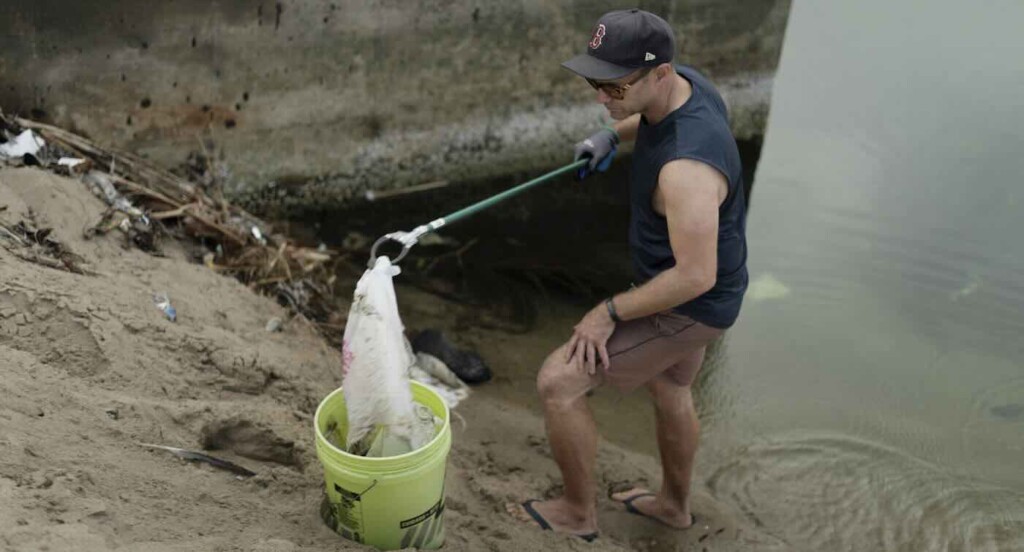 Ocean Conservancy volunteer removes plastic bag from Venice Beach in Los Angeles – Credit: Val Vega for Ocean Conservancy
Ocean Conservancy volunteer removes plastic bag from Venice Beach in Los Angeles – Credit: Val Vega for Ocean ConservancyNew research shows that shoreline litter has been slashed by almost half since plastic bag bans around the U.S. have gone into effect.
The introduction of fees or bans has led to a 47% drop in litter along the coastlines and beaches, say scientists from two universities.
And the decrease rose in magnitude over time—with no evidence of the rates returning to previous levels.
More than 100 countries have now introduced bans or fees for plastic bags, which are among the worst culprits of plastic pollution in the ocean, entangling birds and marine life and breaking down into harmful microplastics.
But what effect those policies were having on the amount of plastic litter in the marine environment had not been fully evaluated until a new study published in the journal Science analyzed the effectiveness of bans across the United States.
The researchers from the University of Delaware and Columbia University found that the fees or bans led to a 25% to 47% decrease in plastic bags as a share of total items collected in shoreline litter-picks compared to areas without such policies.
Study co-author Professor Kimberly Oremus got the idea for the study when she learned that volunteers at coastal beach clean-ups in Delaware were using an app called Clean Swell to track the litter collected.
The figures go into the Ocean Conservancy’s Trash Information and Data for Education and Solutions (TIDES) database, which keeps crowdsourced records from thousands of clean-ups around the world each year.
“When we found the database that had information on different shoreline clean-ups, we realized we could look at the composition of litter before and after a policy to see what effect it had,” said Prof. Oremus, from Delaware’s School of Marine Science and Policy.
The team compiled over 600 policies for 2007-2023, with a lot of variation in their scope and geographic scale.
“A lot of the previous economics literature on plastic bag policies has used checkout data at the store level, explained study lead author Dr. Anna Papp of Columbia University. “So we were excited to add to that a direct measurement of plastic litter on these shorelines.”
The research team looked at tens of thousands of shoreline clean-ups and hundreds of local policies to determine how the legislation worked in terms of reducing plastic litter in the environment.
SAME SUCCESS IN EUROPE: Beach Litter Falls by 30-45% Across European Beaches In Last Deacade, Report Shows
The researchers focused on the United States because it has no federal plastic bag policy, allowing them to compare the effects of different types of policies at the town, county and state level within a single country.
While it might not seem surprising that banning or taxing plastic bags would reduce litter, Prof. Oremus says the results were more robust than she had expected.
“It’s great to see a policy that works in such a clearly measurable way.”
Dr. Papp was surprised to find that around one-in-three Americans are living in an area with some sort of plastic bag policy in place.
The study also found that some legislation seemed to be more effective than others in reducing plastic litter.
They discovered more robust impacts from state level policies compared to town-level policies, with fees appearing to reduce litter even more than bans, though more research is needed to understand why.
Another finding was that the bag bans and fees were most effective in places where the plastic bag litter problem was more severe to begin with.
CHECK OUT MORE SUCCESS: Ocean CleanUp Launches Huge System in Pacific Garbage Patch to Clean a Football Field Every 5 Seconds
With the United Nations Environment Program announcing that the next round of negotiations on an international plastic treaty will happen in August this year, the researchers said their study highlights the opportunity for a more comprehensive approach to the problem.
“Ours is the first large-scale study to use hundreds of policies and tens of thousands of clean-ups to look at their effects,” said Papp. “Overall, our findings do show that plastic bag policies are broadly effective in limiting litter along shorelines.”
COMBAT BAD NEWS By Sharing the Success on Social Media…
Source link

